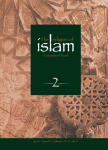The Religion Of Islam vol.2

Ablution
Ablution (Arabic wudû’) is described by the Prophet as the key of prayer, and is founded on the authority of the Koran:-
“O believers. When you prepare yourselves for prayer, wash your faces and hands up to the elbows and wipe your heads and (wash) your feet to the ankles. (V – 6)
These ablutions are absolutely necessary as a preparation for the recital of the liturgical form of prayer, and are performed as follows:-
The worshipper washes his hands first, then he rinses his mouth, throwing the water into it with the right hand. He then throws water, up his nostrils, snuffing it up at the same time, and then belows it out, compressing his nostrils with the thumb of the left hand. He then washes his face with both hands. He next washes his right hand and arm, as high as the elbow, causing the water to run along the arm from the palm of the hand to the elbow, and in the same manner, he washes the left. Afterwards he draws his wetted right hand over the upper part of his head. If he has a beard, he than combs it with the wetted fingers of his right hand. After that he puts the tips of his forefingers wetted with water into his ears and twists them round, passing his thumbs at the same time round the back of the ears from the bottom upwards. Next, he wipes his neck with the fingers of both hands, making the ends of his fingers meet behind his neck, and then drawing them forward. Lastly, he washes his feet, as high as the ankles, and passes his fingers between the toes, ensuring thereby their cleanness.
During this ceremony, which is generally performed in a few minutes, the intending worshipper usually recites some pious ejaculations or prayers before commencing the wudû’ (ablution), e.g. “In the name of God, the Merciful and Beneficent, I perform my wudû’. Praise be to God Who caused water to purify our uncleanliness, and Islam to be our light to the right guidance.”
The ablution needs not be performed before each of the five stated periods of prayer, when the person is conscious, since the last performance of the ablution, of having not been asleep or having avoided every kind of impurity, particularly urination, defaecation or breaking wind. The private parts of the body must also be purified when answering a call of nature.
When water cannot be procured, or would be injurious to health, the ablution may be performed with pure dust or sand. This ceremony is called toyamoum. The permission to use sand for this purpose, when water cannot be obtained, is granted in the Koran:-
“If ye cannot find water, then take fine surface pure sand and wipe your faces and your hands therewith. God does not wish to make any hindrance to you, but He wishes to purify you and that He may complete His favour on you, so that you may be grateful (V – 6)”
It is related in the tradition (hadith) that the Prophet said:-
“The whole earth is fit to serve as a mosque for Muslims to worship on; and the very dust of the earth is fit for purification when water cannot be obtained.”
Tayamoum or purification by sand or clean dust is allowable under the following circumstances: (a) when water cannot be procured except at a great distance (about two miles); (b) in case of sickness; (c) when the use of water is infeasible because of incurring danger from an enemy, a beast or a reptile; and (d) when, on the occasion of the prayers of a feast day or at a funeral, the worshipper is late and has no time to perform the wudû’. On ordinary days or normal conditions, this substitution of tayamoum is not allowable.
The washing of the whole body to absolve it from uncleanliness and to prepare it for the exercise of prayer is absolutely necessary after the following acts: nocturnal emission, menses, coitus, puerperium.
Washing of the whole body is highly recommended (by Sunna or practice and precept of the Prophet) on Friday before going to the mosque for the Friday prayer, on the festivals and after washing the dead.
Purification
Water which may be used for Purification. – The following kinds of water are lawful for purification: rain, sea, river, fountain, well, and snow water. All kinds of water are fit for purification, provided always that the normal colour, smell and taste are not changed, or when the water is not used before.
Rubbing the socks with water in substitution for washing the feet in ceremonial ablution is legally allowed, provided that the socks have been put on after performing a regular ablution, including washing the feet. This legality is sound for twenty-four hours from the time of the regular ablution, after which period the feet must be washed as well as the face and hands.
